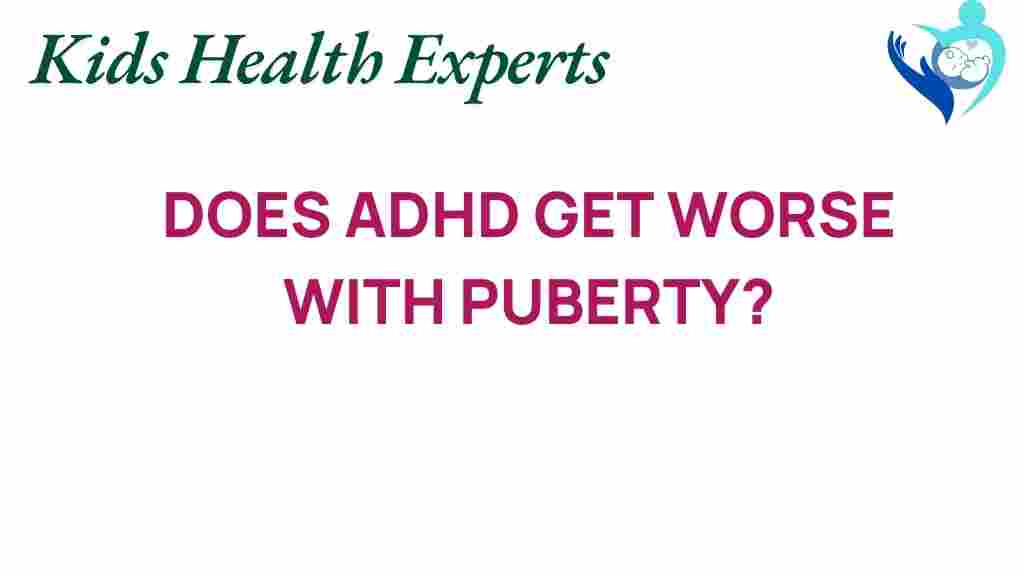Unraveling the Mystery: Does ADHD Worsen During Puberty?
Attention-Deficit/Hyperactivity Disorder (ADHD) is a neurodevelopmental disorder that affects millions of children and often persists into adolescence and adulthood. During puberty, a time of significant physical, emotional, and cognitive changes, many parents and caregivers wonder if the symptoms of ADHD worsen. In this article, we will explore the connection between ADHD and puberty, examining the challenges faced during adolescent development, the impact on mental health, and effective strategies for diagnosis and treatment.
Understanding ADHD and Puberty
ADHD is characterized by persistent patterns of inattention, hyperactivity, and impulsivity. These symptoms can vary greatly in intensity and presentation among individuals. As children transition into puberty, their bodies undergo hormonal changes that can influence behavior and mental health.
During puberty, adolescents experience:
- Increased hormonal fluctuations
- Brain development changes, particularly in areas that regulate impulse control and emotional regulation
- Social pressures and expectations that can exacerbate existing symptoms
These factors can complicate the existing ADHD symptoms, making it essential to observe how puberty affects behavior and mental health.
Symptoms of ADHD During Puberty
While ADHD symptoms are often recognized in childhood, puberty may bring about new challenges. Common symptoms that may become more pronounced during this time include:
- Increased impulsivity: Hormonal changes can heighten impulsive behavior, leading to risky decisions.
- Emotional dysregulation: Adolescents may struggle more with managing emotions, resulting in outbursts or mood swings.
- Decreased attention span: As academic and social demands increase, some may find it harder to concentrate.
- Social challenges: Peer relationships can become more complex, which may exacerbate feelings of isolation or frustration.
Challenges of ADHD During Adolescence
Adolescents with ADHD face unique challenges that can impact their overall mental health and development:
- Academic struggles: Increased workload and expectations in school can overwhelm teens with ADHD.
- Social isolation: Difficulty in peer relationships can lead to feelings of loneliness or depression.
- Co-occurring disorders: Adolescents with ADHD are at higher risk for developing anxiety disorders and depression.
- Family dynamics: Increased conflict at home can arise due to misunderstandings about ADHD behavior.
Diagnosis of ADHD During Puberty
Diagnosing ADHD during puberty can be more challenging than in childhood due to overlapping symptoms with typical adolescent behavior. If you suspect that your child’s ADHD symptoms are worsening during puberty, consider the following steps:
- Consult a healthcare professional: A pediatrician or child psychologist can provide an accurate assessment of ADHD symptoms and their impact on daily life.
- Gather observations: Parents and teachers should document specific behaviors, including frequency and context, to provide a clearer picture of the challenges faced.
- Consider standardized assessments: Tools like the ADHD Rating Scale can help quantify symptoms and guide treatment.
Treatment Options for ADHD During Puberty
Effective treatment for ADHD during puberty often requires a multi-faceted approach. Here are some commonly used strategies:
- Medication: Stimulants (e.g., methylphenidate, amphetamines) and non-stimulants (e.g., atomoxetine) are commonly prescribed to manage symptoms.
- Behavioral therapy: Cognitive-behavioral therapy (CBT) can help adolescents develop coping strategies for emotional regulation and impulsivity.
- Family support: Involving parents in therapy can improve family dynamics and provide additional resources for managing symptoms.
- School accommodations: Collaborating with educators to implement IEPs or 504 Plans can help support academic success.
It is essential to tailor treatment plans to each individual’s needs, as responses to ADHD treatment can vary significantly during adolescence.
Behavioral Strategies for Managing ADHD During Puberty
In addition to professional treatment, parents and adolescents can employ various behavioral strategies to manage symptoms effectively:
- Establish routines: Consistency helps create a sense of stability, making it easier for adolescents to manage their time and responsibilities.
- Foster open communication: Encourage your child to express their feelings and challenges, creating an environment of support.
- Promote healthy habits: Regular physical activity, a balanced diet, and sufficient sleep can positively impact mental health and behavior.
- Utilize organizational tools: Calendars, planners, and reminders can help adolescents stay on track with their responsibilities.
Troubleshooting Tips for Parents
If you notice increased ADHD symptoms during puberty, try the following troubleshooting tips:
- Monitor changes: Keep a journal of behavioral changes, noting any specific triggers or situations that exacerbate symptoms.
- Adjust treatment as needed: Work closely with healthcare providers to assess whether adjustments to medication or therapy are necessary.
- Encourage peer interaction: Facilitate social opportunities with understanding peers to help build social skills and reduce feelings of isolation.
- Educate yourself: Stay informed about ADHD and adolescent development to better understand your child’s experiences and challenges. You can explore more resources on ADHD here.
Conclusion
Understanding the relationship between ADHD and puberty is crucial for parents and caregivers. While some adolescents may experience a worsening of ADHD symptoms during this critical phase of development, recognizing these changes can lead to effective management strategies. By prioritizing mental health, embracing supportive treatments, and fostering open communication, families can navigate the challenges of adolescent development more successfully.
As research continues to unveil the complexities of ADHD in the context of puberty, staying informed and proactive can empower families to support their children in thriving during these transformative years. If you have further questions or need support, do not hesitate to reach out to mental health professionals or visit credible resources like this external link.
This article is in the category Mental and created by KidsHealthExperts Team
